German POW Camp
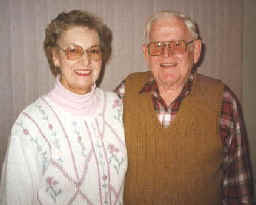
Betty & Ed Fridley
John Edwin Fridley, Anna, was in the 70th Infantry Division,
275th Regiment, 3rd Battalion, Company I, assigned to the left flank of the 7th U.S. Army.
His unit fought in the Vosges Mountains, the foothills of the mountains of Alsace
Lorraine. The Vosges had never before been fought across, not even by Napoleon. Fridley
was captured, between Philipsbourg, Alsace Lorraine (France), and Bitche (Germany). Co. I
was involved in the Nordwind Campaign, started by the Germans to take the pressure off the
Germans at the Battle of the Bulge by making the Allies spread their forces thinner.
Following are excerpts taken from material Ed dictated to his mother and father, Archie
and Vesta Fridley, when he returned to Anna in the latter part of June 1945. He had been
held prisoner for 135 days.
It was New Year's Eve in 1945, and our Company had moved up the hills by trucks
to Saarbrucken, Germany, having come from Strasburg, France. It was cold, snowy, and
disagreeable. We climbed out of the trucks and marched about five miles on up the hills
where we dug in. We were ambushed and we retreated; several men were wounded. Then we came
under artillery fire. A bunch of greenhorn soldiers had their first taste of the real war.
Two of us and our squad leader went back in a Jeep to Philipsbourg to get orders. The
Germans found us and took us prisoner. The Germans were so excited to find a carton of
K-rations in the jeep they almost got into a fight over them. We were taken by Jeep, under
guard, back into the hills where Company I had been fighting. Many of our Company were
taken prisoner. We stopped to pick up two of our wounded
men and took them to their headquarters. The Germans loaded the wounded into a horse-drawn
wagon and took them to a German hospital nearby. This was typical of the type of equipment
the Germans had remaining. They were considerate of the wounded men.
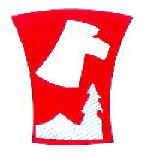
70th Infantry Division Patch
We were interrogated and driven on in the Jeep. We met up
with fifty or so of our men, who had also been captured; we marched with them. At an old
barn, we were searched, interrogated, and relieved of our personal property. But they let
me keep my billfold, Bible, pictures, comb, pipe and tobacco. We were given a slice of
thick brown bread, our only food for the day. But it was to get worse.
We marched for five days, sleeping in old buildings, sometimes so crowded we couldn't
all lie down. Always under guard. Once in the four days, we got a bowl of good soup,
otherwise it was a piece of dark bread, maybe a bite of slimey cheese. The Germans tried
to find us food, but there was nothing.
Rail Boxcar Becomes First Prison
By now our group had increased to around 90 men. We marched to a railroad track and
along with more POWs were loaded into 40 and 8 boxcars. This means the car was built to
hold 40 men or 8 horses. We had around 70 men in our car. There were eight or nine boxcars
making up the train. We were on this train three days and nights.
For elimination, we passed someone's steel helmet and we tried to throw it out a small
round window near the top of the boxcars. We took turns sitting down. We had no food and
no water. We would reach out the little windows and break off an icicle. We tried to
divide it among the men. We were always locked in.
The train traveled only by night; by day we sat on the
tracks in some city, locked in and guarded. The Americans bombed by day, and the British
bombed by night. On the fourth day, we unloaded and were given a half loaf of German
bread, a quarter pound of some kind of sausage, and no water. This was the only time we
got sausage. We scooped up snow to drink. We were marched again to a POW camp, Stalag V A,
close to Ludwigsburg.
There were three more train rides to come,
all with the same accommodations. But, the only food was hot water with maybe a chunk of
vegetable, and a thick slice of bread, no water. Between each ride we marched to a large
building, or a camp, stayed a couple of days, then marched to another railroad yard. We
were interrogated at each stop.
Biver was crippled and getting weary. George and I knew
the Germans would shoot him if he dropped out of line, so we supported him with his arms
around our shoulders so he could keep up.
When we arrived at Stalag IV B, an old brick building, they served eight of us porridge
in a helmet. It was mostly just water. They had taken our eating utensils at some point.
Here we had hot showers, and our clothes deloused. Then we stood in a large cold room and
waited a couple of hours for our clothes to be returned. They gave us a typhoid shot,
administered by an Englishman. He gave us advice on coping. Here we received a Red Cross
package to be shared by seven men.
We were five days and five nights on the train enroute to Stalag XIIA. This boxcar was
even more crowded. Same procedure, same treatment, same sparse food, lots of questions. We
were issued POW dog tags to wear around of necks. Biver was kept at this POW camp because
he was crippled.
Our last train ride was more endurable. Some 300 prisoners
were crowded into the 40 and 8’s with around 60 men in each car. We were allowed to
get out and exercise and they gave us ice for water. But it was the same sparse food. We
were all dehydrated.
Bombs Hit Prisoner Train
On this ride, someplace between Limburg, Germany, and Lillienstein, the bombs fell
around us. We were scared. We all prayed. Our prayers were so intense that we could feel
the power of the Lord lifting us away from all this carnage and giving us a safe retreat.
A boxcar filled with American soldiers, 3 or 4 up the train from us, was hit; many were
killed. We disembarked at Lillienstein and marched to Stalag IV A, Lager, meaning it was a
work camp. We were confined there from about January 30 to May 7, 1945.
It was a beautiful wooded area, on the banks of the Elbe river, about 25 miles
downstream from Dresden. Same drab wooden barracks were divided into rooms or huts about
15 feet square with 25 or 30 men in each. We were issued a blanket, a bowl and a skilly
ticket for our bowl of "dishwater" soup. For breakfast we got a cup of barley
coffee and a small chunk of dark bread made mostly of sawdust. We would lick it and stick
it on the side of the stove in our hut and toast it. This was possible only if we were
fortunate to have found wood for a fire. For supper we had a pint of hot water with a
small potato, if lucky. Occasionally we got a bite of slimey cheese.
We were put to work digging a
trench to bring a water line to our camp. It was February and it was cold and raw. While
working on the trenches, we would sneak over to huge mounds of vegetables, rutabagas,
potatoes, and onions. They were covered with leaves and dirt. We would pilfer what food we
could, hiding it in our loose and baggy clothes, which were getting baggier every day. The
guards would fire over our heads; we would drop our loot (most of it) and run back to the
trench to work. Hummingbird, a native American, was never caught.
We had nicknames for
some of the guards. There was Snake Eyes, Bull Neck, Sacramento (because he kept yelling
what sounded like "Sacramento" to us as we worked). There was Redhead; I was a
carrot top also and it caused me to be interrogated more often than some others. They
thought I was of German ancestry.
We were counted every morning. Old Mort was
always slow in getting out of the hut. On this particular morning, Snake Eyes went inside
to fetch him out. He placed the muzzle of his rifle beside his rear and shot off a blank.
Scared Old Mort so bad he never dallied after that.
After we finished the water line,
we were put to work across the Elbe river, where the Germans were trying to build a
refinery under a cliff. Before leaving for work one morning, some of the prisoners spotted
a rabbit and took chase. Old Mort caught the hare and could just taste the delicious
rabbit stew for which he had the makings in his hand. Then he thought of Snake Eyes
probably watching him from behind some place, and let the rabbit go.
We could hear the bombing of Dresden and see the B-17s fly over. They would rattle our
barracks.
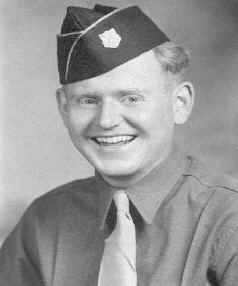
Ed Fridley
posed for this portrait in 1944 before shipping out to the European War theater.
Poor
Food, Illness
There was constant dysentery among the men. I had pleurisy twice and nearly died from
it the last time. Then I got yellow jaundice. While in the hospital, my buddy, Stan, would
bring me a cup of tea, and I would give him my soup for I couldn't drink it. We were all a
skinny, scraggly bag of bones. I could reach around my arm any place with my thumb and
middle finger touching. During this ordeal, I went from around 160 pounds to 96 pounds.
Once Stan went with a detail to get a dead horse. Then we had good soup for a day. The
Germans had little food to offer; we envied the food our pets got at home. Food was always
on our minds.
Religious Services
We had frequent worship services. Stan usually read scripture, someone would read from
his Catholic prayer book, and we would sing a hymn and pray. We didn't know how we could
survive much longer on so little food, but the prayers were uplifting and they
strengthened our faith. It made us wonder why we had survived this long; what was our
purpose in life?
Easter, 1945, will forever stand out in my mind. Around noon, some 200 forlorn men,
British and American, gathered for a worship service in the open area. Johnny Hampton, who
had been a vocalist with a big name band, sang Easter Parade. It was a
tear-jerker. Here we were in this deplorable state. We remembered what living once was
like.
By the first of May the Russians
had taken Dresden and were within 25 miles of us. Flyers were circulated among us by the
Germans asking us to volunteer to fight the Russians. Big joke. The Germans did not want
to be taken by the Russians. On May 7, the guards started marching us toward the American
lines. We were too weak to hurry and the Russians were breathing down our necks. So the
German guards just scattered. We had been in Stalag IV A 96 days.
We followed the road
past vehicles, a slain German soldier who looked like roadkill, horses, and wagons. We
found a group of men devouring a team of strafed horses. We joined them for a cut and
roasted it over their fire. But we either didn't let it cook long enough or we ate too
much for we got sick. We walked into Kuhm, Czechoslovakia, where we met an old
couple who offered us food and beds. Four of us stayed there. By now the Russians had
overtaken us and were giving orders.
After several days in Kuhm the Russians ordered us to march to Teplice, a town a few
miles up the road. There we boarded a train headed for the American lines. But the train
ran out of fuel even though they conserved steam by blowing the whistles by mouth. We
stalled across a road. But our prayers were answered; along came an American patrol, who
radioed for help. Shortly, a locomotive came for us. It was run by the U. S. Corps of
Engineers and took us a’flying into the headquarters of the Red Ball Express (RBE).
They blew the whistles all the way and not by mouth, either.

Photo to the left: Note the 70th
Infantry Division Patch on Ed Fridley's Sleeve.The RBE was an expert black unit of the
Transportation Corps. They trucked us to the airport in Pilsen and we were flown to Lucky
Strike Camp at Le Harve, France. There we were issued new clothes, bug powder, and given a
nutritious diet, in small quantities at first. We had red beets twice every day. I will
not eat red beets nor potato soup to this day.
Two weeks later, we boarded a ship for
the States. Twice we had boiler trouble, and had to sit for a couple of days. Both times
they had to let the boiler cool so they could work on it. Queen Elizabeth passed us twice,
coming and going.
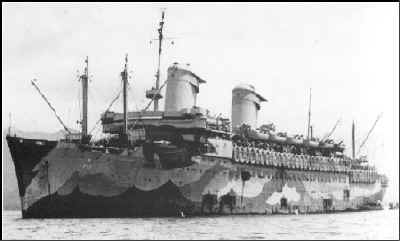
U.S.S. West Point
We ran out of food and had to eat K-rations. We missed our scheduled time in New York
and couldn't dock. So the ship went on to Newport News. There all the other ships, which
were waiting to unload, were held up for us to sail right in and dock. An Army band was
playing Don't Fence Me In as we came down the gangplank. We did not like that. We
resented it because we thought they were making a mockery out of us POW’s. What a
homecoming, but we had learned how to survive.
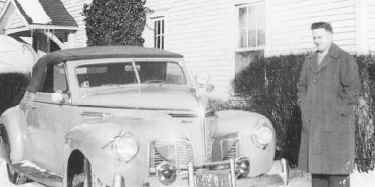
Ed’s parents,
Archie and Vesta Fridley, went for weeks without hearing what had happened to him.
"But, there was no doubt in their minds that I was coming back," Ed said. They
kept his car for him, a 1940, gray Plymouth convertible. Ed posed here before he entered
the service.
[ Back to War Index ] |

